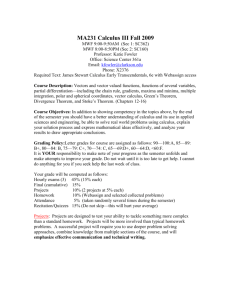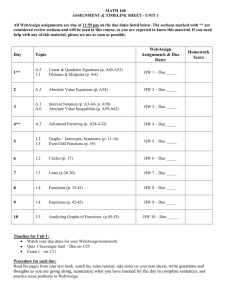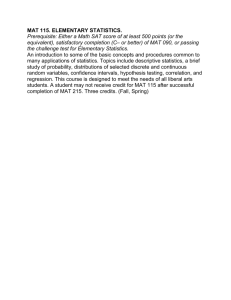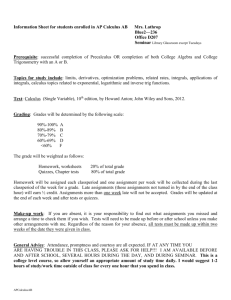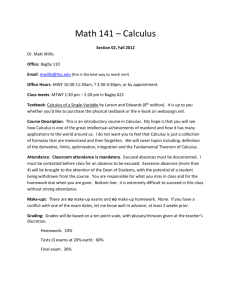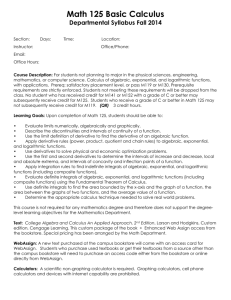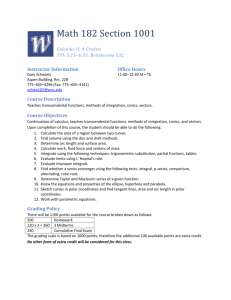Word document - People Server at UNCW
advertisement
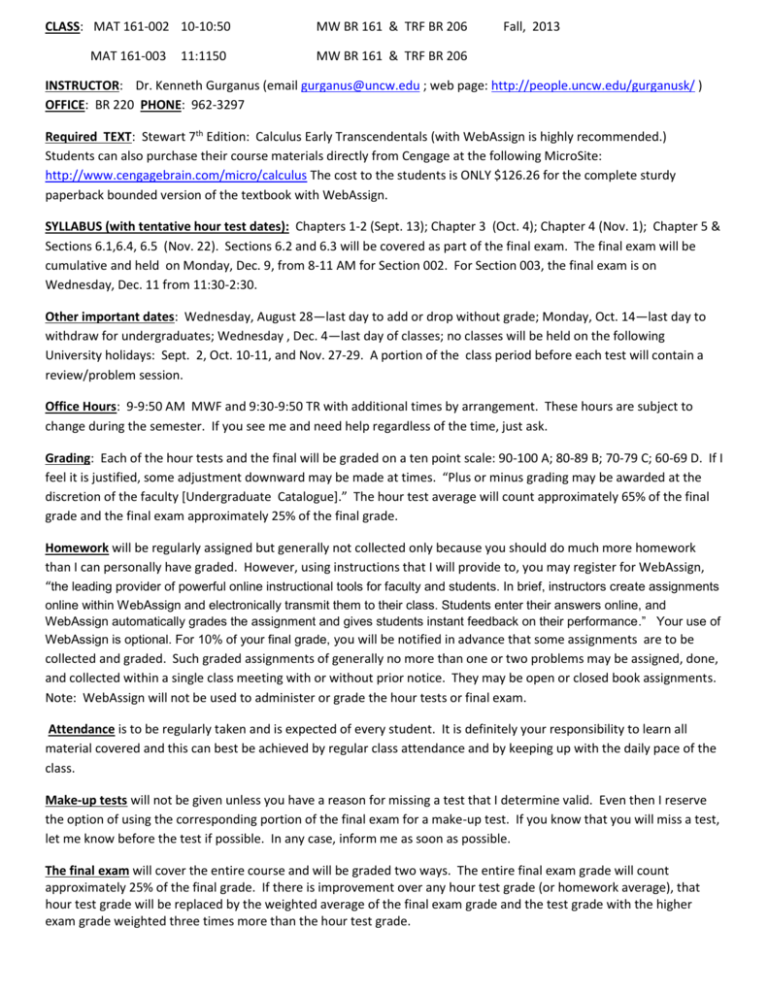
CLASS: MAT 161-002 10-10:50 MAT 161-003 11:1150 MW BR 161 & TRF BR 206 Fall, 2013 MW BR 161 & TRF BR 206 INSTRUCTOR: Dr. Kenneth Gurganus (email gurganus@uncw.edu ; web page: http://people.uncw.edu/gurganusk/ ) OFFICE: BR 220 PHONE: 962-3297 Required TEXT: Stewart 7th Edition: Calculus Early Transcendentals (with WebAssign is highly recommended.) Students can also purchase their course materials directly from Cengage at the following MicroSite: http://www.cengagebrain.com/micro/calculus The cost to the students is ONLY $126.26 for the complete sturdy paperback bounded version of the textbook with WebAssign. SYLLABUS (with tentative hour test dates): Chapters 1-2 (Sept. 13); Chapter 3 (Oct. 4); Chapter 4 (Nov. 1); Chapter 5 & Sections 6.1,6.4, 6.5 (Nov. 22). Sections 6.2 and 6.3 will be covered as part of the final exam. The final exam will be cumulative and held on Monday, Dec. 9, from 8-11 AM for Section 002. For Section 003, the final exam is on Wednesday, Dec. 11 from 11:30-2:30. Other important dates: Wednesday, August 28—last day to add or drop without grade; Monday, Oct. 14—last day to withdraw for undergraduates; Wednesday , Dec. 4—last day of classes; no classes will be held on the following University holidays: Sept. 2, Oct. 10-11, and Nov. 27-29. A portion of the class period before each test will contain a review/problem session. Office Hours: 9-9:50 AM MWF and 9:30-9:50 TR with additional times by arrangement. These hours are subject to change during the semester. If you see me and need help regardless of the time, just ask. Grading: Each of the hour tests and the final will be graded on a ten point scale: 90-100 A; 80-89 B; 70-79 C; 60-69 D. If I feel it is justified, some adjustment downward may be made at times. “Plus or minus grading may be awarded at the discretion of the faculty [Undergraduate Catalogue].” The hour test average will count approximately 65% of the final grade and the final exam approximately 25% of the final grade. Homework will be regularly assigned but generally not collected only because you should do much more homework than I can personally have graded. However, using instructions that I will provide to, you may register for WebAssign, “the leading provider of powerful online instructional tools for faculty and students. In brief, instructors create assignments online within WebAssign and electronically transmit them to their class. Students enter their answers online, and WebAssign automatically grades the assignment and gives students instant feedback on their performance.” Your use of WebAssign is optional. For 10% of your final grade, you will be notified in advance that some assignments are to be collected and graded. Such graded assignments of generally no more than one or two problems may be assigned, done, and collected within a single class meeting with or without prior notice. They may be open or closed book assignments. Note: WebAssign will not be used to administer or grade the hour tests or final exam. Attendance is to be regularly taken and is expected of every student. It is definitely your responsibility to learn all material covered and this can best be achieved by regular class attendance and by keeping up with the daily pace of the class. Make-up tests will not be given unless you have a reason for missing a test that I determine valid. Even then I reserve the option of using the corresponding portion of the final exam for a make-up test. If you know that you will miss a test, let me know before the test if possible. In any case, inform me as soon as possible. The final exam will cover the entire course and will be graded two ways. The entire final exam grade will count approximately 25% of the final grade. If there is improvement over any hour test grade (or homework average), that hour test grade will be replaced by the weighted average of the final exam grade and the test grade with the higher exam grade weighted three times more than the hour test grade. Students with Disabilities: If you have a disability and need reasonable accommodation in this course, you should inform me of this fact in writing within the first week of class or as soon as possible. If you have not already done so, you must register with the Office of Disability Services in Westside Hall (extension 7555) and obtain a copy of your Accommodation Letter. You should then meet with me to make mutually agreeable arrangements based on the recommendations of the Accommodation Letter. UNCW’s Academic Honor Code applies to all members of the university community. All students are expected to read and abide by the Academic Honor Code that is in the Student Handbook and Code of Student Life. Course Catalog Description: MAT 161-162. Calculus with Analytic Geometry (4-4) Prerequisite: MAT 112 or 115 or equivalent preparation in algebra and trigonometry. Calculus of a single variable intended for students in the mathematical and natural sciences. Functions and limits; differentiation with applications including maxima and minima, related rates, approximations; theory of integration with applications; transcendental functions; infinite sequences and series; conic sections, parametrized curves and polar coordinates; elementary differential equations. Three lecture and two hour laboratory hours each week. Goal of the Course: MAT 161 is the initial half of the standard university single variable calculus sequence. Its principal goal is to show how calculus has served as the primary quantitative language of science and engineering for the last three centuries. It provides the theoretical basis used to model change. Students in this course will develop the mathematical skills found in the core topics of limits, derivatives and integration, rigor and estimation. Students will investigate the wider application of these skills in the natural and social sciences and communicate the results of these investigations. MAT 161 will count for the Mathematics and Statistics requirement in University Studies. If another course is used to meet the Mathematics and Statistics requirement of University Studies, MAT 161 may count for the Quantitative and Logical Reasoning requirement.. Course Student Learning Objectives: Upon completing the MAT 161, students should be able to: Use graphical, numerical, analytical and verbal representations of functions, limits, derivatives and integrals. understand the meaning of the derivative in terms of a rate of change and local linear approximation and use derivatives to solve a variety of problems. understand the meaning of the definite integral both as a limit of Riemann sums and as the net accumulation of change and use integrals to solve a variety of problems. understand the relationship between the derivative and the definite integral as expressed in the Fundamental Theorem of Calculus. use correct mathematical syntax to explain solutions in both written and graphic forms. model physical situations using the concepts of calculus. use technology to help solve problems, experiment, interpret results, and verify and communicate conclusions. determine the reasonableness of solutions, including sign, size, relative accuracy, and units of measurement. MAPLE is the principal mathematical software used in MAT 161. The departmentally approved and required minimal expectations for computer use in MAT 161 are: graphing and graphical analysis, Newton’s Method, Riemann Sums, and linear and quadratic approximations. Technology may clearly be used for additional purposes, including evaluation of definite integrals arising in applications. The text identifies by a special icon those exercises that require some form of technology. Exercises that require the full power of MAPLE are identified in the text by a CAS icon (for computer algebra system). Students will utilize this technology in classroom exercises in BR 161 and other lab assignments to be completed outside of class. A graphing calculator is advisable, but not required, for this class. In accordance with North Carolina G.S. 116-11(3a), you are entitled to two excused absences for religious observances per academic year. In order to preserve your right to make up any tests or other work missed for religious observance required by your faith, you must inform the Registrar in writing of your intended absence before the end of the first week of class.

